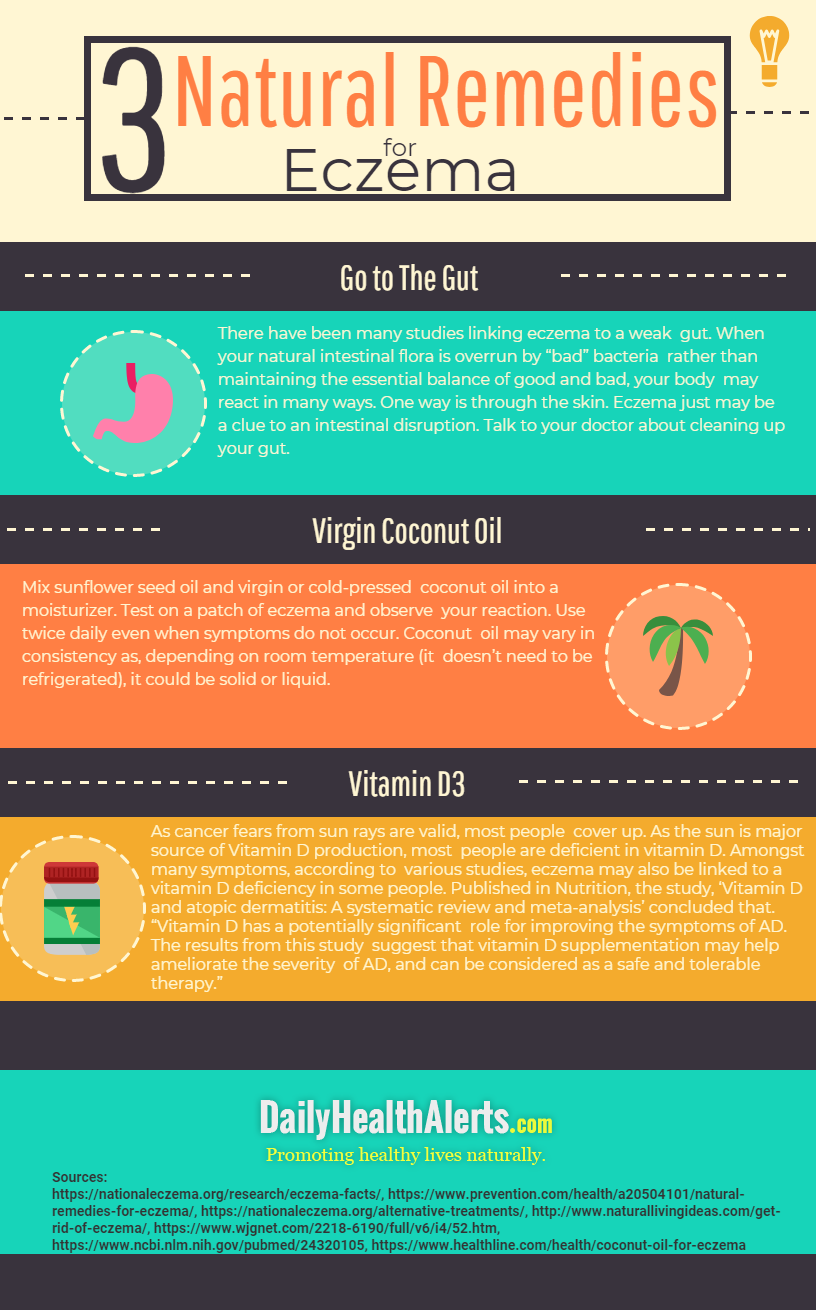Skin problems can be very frustrating. Conventional medicine often approaches most skin outbreaks with topical pharmaceuticals that may often quell symptoms but rarely address the root cause. Therefore, you could be slathering on expensive, powerful, synthetic ointments, lotions or gels that may be doing more harm than good.
These 3 natural remedies for eczema are recommended to be used in conjunction with one another. Studies show this formula to be less invasive and more assimilated by the body. It is trio worth trying for several months to see if you can turn your eczema into the healthy skin you deserve.
Addressing Eczema
Knowing your relationship to eczema is an important part of combating it. Many people assume that they have contracted something and need medicine to combat it. However, by investigating possible outside or inside factors, your eczema may be able to be treated naturally and, possibly, terminated.
According to the National Eczema Association (NEA), there are 8 types of eczema. The most prominent are:
31.6 million people (10.1%) in the U.S. have some form of eczema with children and women on the front lines. Race varies with multi-racial people most affected and African Americans the least.
The NEA reports that,
Dealing with the constant itching, redness, flaking, inflammation and many other symptoms of eczema can be harrowing. When conventional medicine only covers up your symptoms, trying a natural remedy may help.

Go to the Gut
There have been many studies linking eczema to a weak gut. When your natural intestinal flora is overrun by “bad” bacteria rather than maintaining the essential balance of good and bad, your body may react in many ways. One way is through the skin. Eczema just may be a clue to an intestinal disruption.
In the study, ‘Skin-gut axis: The relationship between intestinal bacteria and skin health’ by researchers at Drexel University College of Medicine, Philadelphia, PA, it was concluded that,
“The intimate relationship between the gut and skin is undeniable. Possibly, both the intestinal bacteria themselves and their metabolic by-products influence skin physiology. The mechanisms are still under study but there are a few theories: (1) bacterial products and diet could alter the physiology of the gut epithelium, resulting in different secretory products that might circulate systemically and reach the skin; (2) neurotransmitters, hormones, and other bioactive chemicals such as SCFAs [short chain fatty acids] derived from the gut could all act on receptors within the skin and directly alter the skin or alter the skin’s commensal bacteria; and (3) ingested compounds and chemicals may absorb and have a direct effect on the skin’s appearance or function.”
Talk to your doctor or health professional about cleaning up your gut. This may mean integrating a daily probiotic supplement protocol into your diet along with avoiding gut weakening foods such as dairy, processed sugars and alcohol.
VCO
Virgin coconut oil has been used for centuries as a beneficial skin treatment. A 2014 study published in the International Journal of Dermatology reported that,
“…among pediatric patients with mild to moderate AD [atopic dermatitis], topical application of VCO [virgin coconut oil] for eight weeks was superior to that of mineral oil based on clinical (SCORAD) [scoring of atopic dermatitis] and instrumental (TEWL [transepidermal water loss], skin capacitance) assessments.”
Mix sunflower seed oil and virgin or cold-pressed coconut oil into a moisturizer. Test on a patch of eczema and observe your reaction. Use twice daily even when symptoms do not occur. Coconut oil may vary in consistency as, depending on room temperature (it doesn’t need to be refrigerated), it could be solid or liquid. Do not dip your hand into your homemade eczema treatment jar as this could spoil it. Instead, pour some in your hand or a separate container. NOTE: If you are allergic to coconuts and possibly just nuts be careful when using coconut oil on the skin.
Vitamin D3
As cancer fears from sun rays are valid, most people cover up. As the sun is major source of Vitamin D production, most people are deficient in vitamin D. Amongst many symptoms, according to various studies, eczema may also be linked to a vitamin D deficiency in some people.
Published in Nutrition, the study, ‘Vitamin D and atopic dermatitis: A systematic review and meta-analysis’ concluded that.
“Vitamin D has a potentially significant role for improving the symptoms of AD. The results from this study suggest that vitamin D supplementation may help ameliorate the severity of AD, and can be considered as a safe and tolerable therapy.”
Also, the NEC reported that,
“Robert Sidbury, M.D., a Seattle-based pediatric dermatologist and member of the NEA Scientific Advisory Committee, studied 11 children with severe eczema whose condition worsened in the winter, giving them either 1,000 IU of vitamin D or a placebo. Eighty percent of those who took vitamin D improved and none reported worsening, whereas everyone in the placebo group essentially stayed the same.”
Talk to your health practitioner about adding vitamin D3 supplements into your diet. Also, the following foods have good levels of vitamin D: salmon, swordfish, sardines, tuna eggs, cheese, mushrooms, or fortified orange juice, milk, cereal, or yogurt.
These 3 natural remedies for eczema are a skin formula that could be just what you need get your skin health back on track. Keep in mind that this is a transformative process so results may not be seen for a few weeks or even months. However, it took your body a long time to develop and suffer with eczema so it will take some time to reduce symptoms or get rid of it altogether.